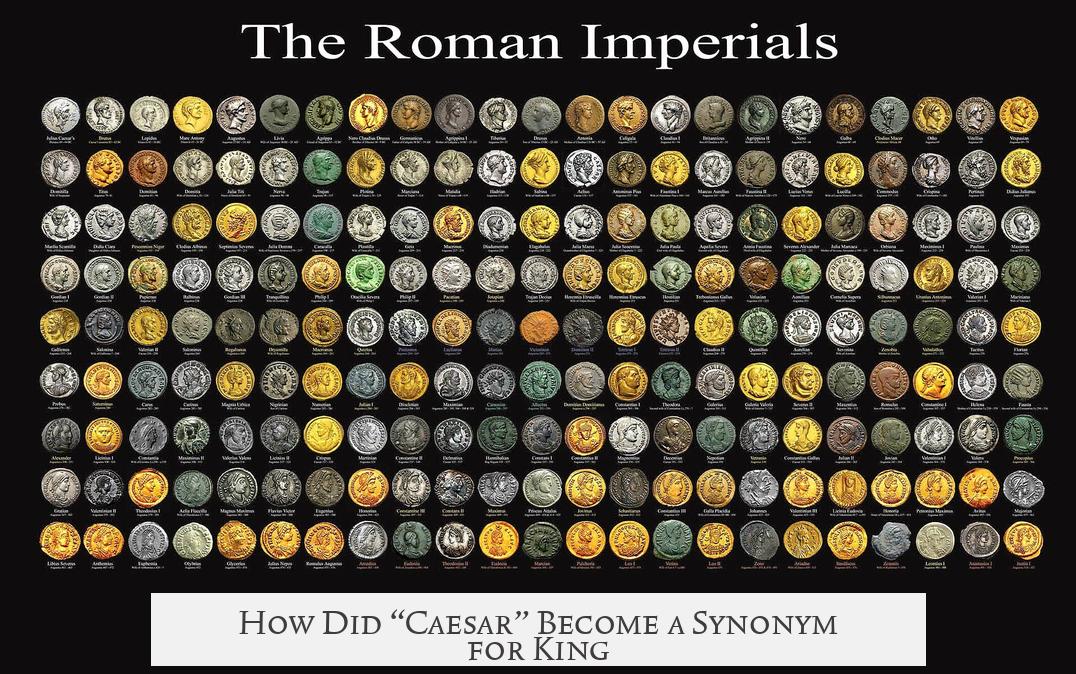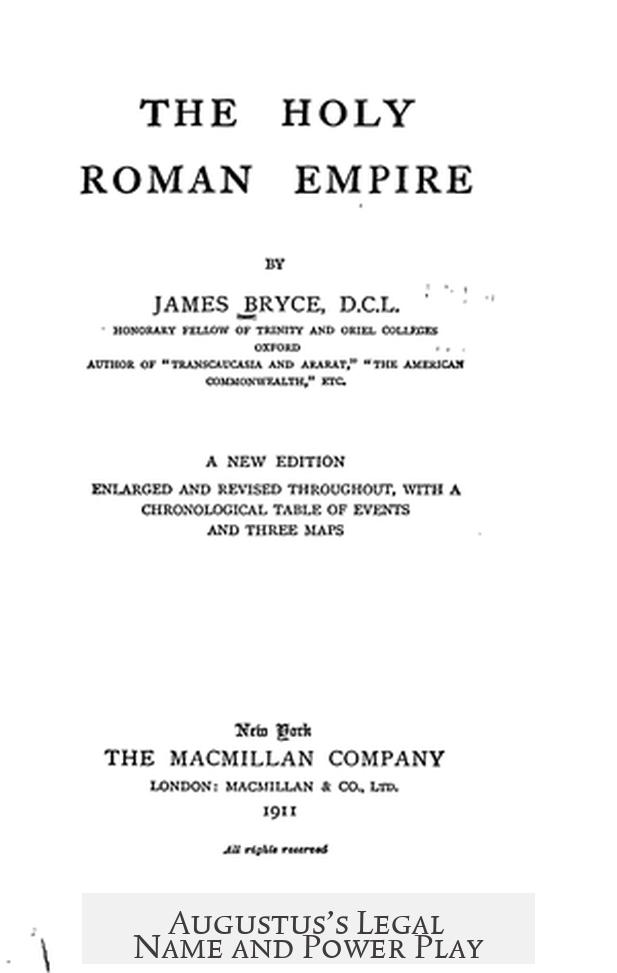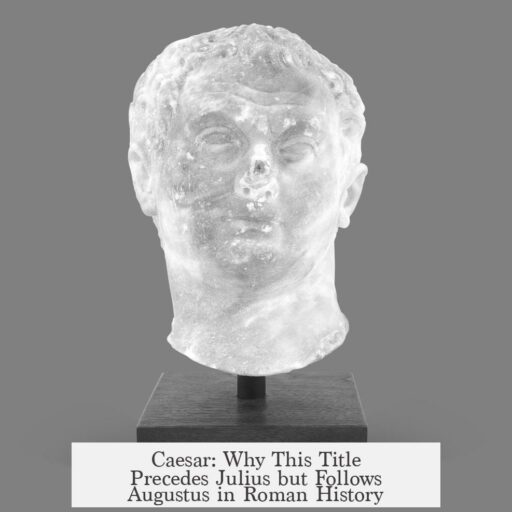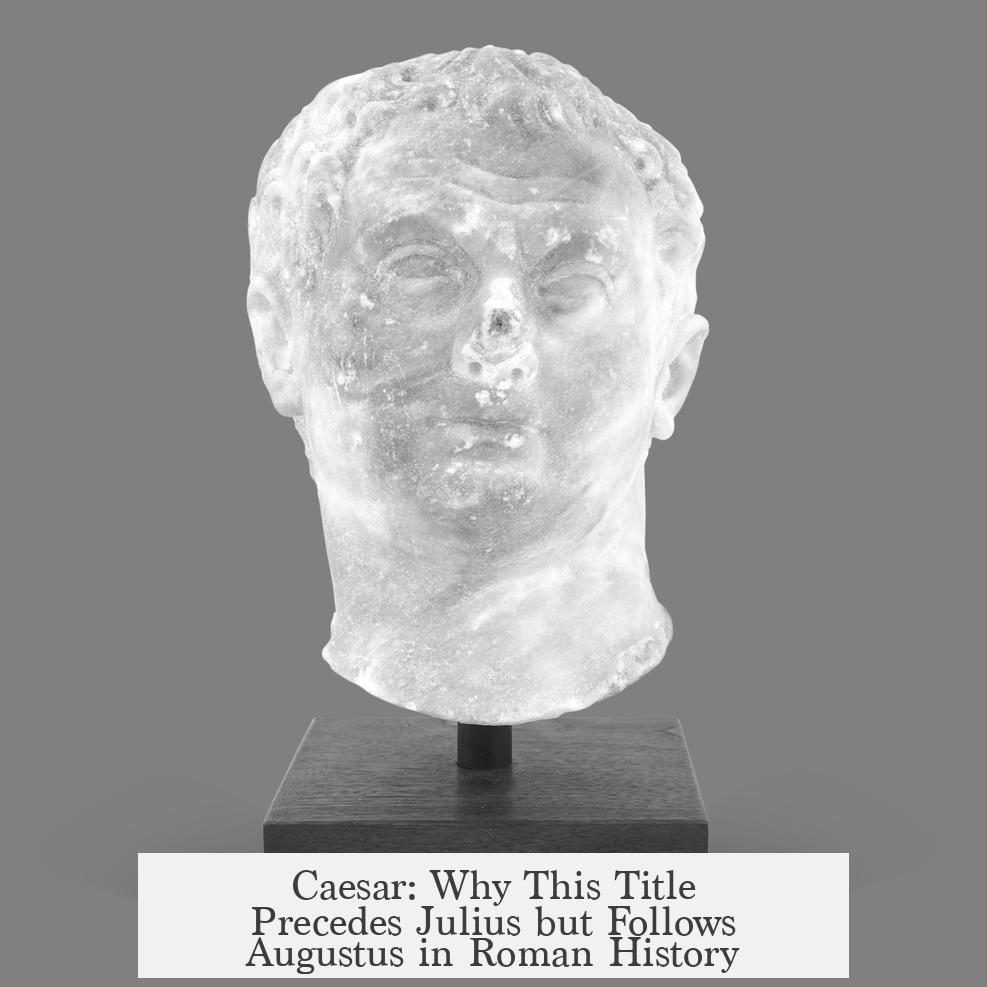The reason “Caesar” appears after Julius but before Augustus lies in its transformation from a family name (cognomen) to a formal imperial title used in Roman emperor naming conventions.
Initially, “Caesar” was a cognomen in Roman names, a kind of inherited nickname within the Julius family. For Gaius Julius Caesar, “Caesar” functioned as a surname, following Roman naming traditions that placed the praenomen (given name) first, then the nomen (clan name), and lastly the cognomen (family branch or nickname). In Julius Caesar’s full name, “Gaius Julius Caesar,” “Caesar” marks his specific branch of the Julii family. Contrary to popular belief, the Latin term “caesar” originally meant “hairy,” possibly referencing an ancestor’s distinctive feature, not “king.” This word was not a title during Julius Caesar’s lifetime but just a hereditary family name.
Augustus, born Gaius Octavius, was Julius Caesar’s grandnephew but inherited the Caesar name only after Julius Caesar posthumously adopted him. Octavian (Augustus’ name before he assumed the title) adopted “Caesar” as part of his new name, styling himself as Gaius Julius Caesar Octavianus to signal his status as Caesar’s heir. Despite this, “Caesar” still initially served as a name element rather than a title.
Augustus introduced the honorific “Augustus,” meaning “majestic” or “venerable,” which was not a cognomen but an official imperial title. Unlike “Caesar,” it was always positioned at the end of the name. Augustus’ full official name combined “Imperator” (commander), “Caesar” (family name-turned-title), and “Augustus” (honorific title). This combination illustrated a shift in naming conventions where “Caesar” evolved into a heralded imperial title while “Augustus” marked supreme dignity. Augustus is unique in Roman history for legally incorporating “Augustus” as part of his personal name, which later emperors used only as a title.
The real shift in placement comes from the redefinition of “Caesar” during the Roman Empire. About a century after Julius Caesar, emperors began to treat “Caesar” as a rank or title rather than just a surname. With Antoninus Pius (reigning about 200 years later), “Caesar” moved from behind the name to before the emperor’s personal name. This placement harmonized “Caesar” with other imperial designations like “Imperator.” Hence, later emperors bore titles like “Imperator Caesar [Personal Name] Augustus,” emphasizing “Caesar” as a status marker rather than a family cognomen.
This adjustment clarified the role of “Caesar” and distinguished it from regular cognomina, signaling the emperor’s authority. It also separated the title from the emperor’s birth name. For Julius Caesar, it remains a surname at the end, as he was not an emperor. For Augustus, “Caesar” became his imperial title placed before his personal name, with “Augustus” as an added mandatory honorific at the end.
| Name | “Caesar” Position | Function | “Augustus” Position | Function |
|---|---|---|---|---|
| Gaius Julius Caesar | At end | Cognomen (family name) | None | Not used |
| Caesar Augustus (Octavian) | Before personal name | Imperial title derived from adopted name | At end | Honorific, denoting majesty |
Historians commonly call “Julius Caesar” simply as such because “Caesar” is his distinctive surname. Augustus is referred to primarily by his title, “Augustus,” though his full style includes “Caesar” as an imperial title preceding his personal name. This helps differentiate their roles: Julius Caesar was a Roman general and dictator, while Augustus was the first Roman emperor who formalized imperial titles.
To summarize the key points:
- “Caesar” began as a family cognomen used by Julius Caesar, placed at the end of his name.
- “Caesar” transitioned into a formal title under the Roman Empire, denoting imperial authority.
- Augustus adopted “Caesar” as a title positioned before his personal name, aligning with other imperial titles like “Imperator.”
- “Augustus” was an honorific title placed at the end of the name, unique to Augustus himself and subsequent emperors as a mark of supreme rule.
- The change in “Caesar’s” placement reflects its transformation from a hereditary surname to a title signaling kingship or emperor status.
“Caesar” Means King: Why Is This Word Normally Put in Front of Julius but Behind Augustus?

Ever scratched your head wondering why we say Julius Caesar but then flip it to “Caesar Augustus” when talking about the emperor who followed him? It sounds like a quirky name game, but it’s actually rooted in Roman naming traditions and political evolution. Let’s unravel this tale, where history, language, and power play all intersect.
The quick answer: For Julius Caesar, “Caesar” was originally part of his personal name—a cognomen akin to a family nickname—not a royal title. For Augustus, “Caesar” transformed into a title that signified imperial authority, while “Augustus” became the honored title attached at the end of his name to mark his supreme status. The placement of “Caesar” and “Augustus” reflects this shift from personal name to title.
From Name to Title: The Story Behind “Caesar”
Julius Caesar wasn’t born a king, nor was “Caesar” a title during his time. His full original name was Gaius Julius Caesar. Roman patrician names carried three parts: praenomen (first name), nomen (clan name), and cognomen (branch of family or nickname). That “Caesar” was his cognomen, a kind of nickname passed down in the family, much like a label showing you belong to a particular clan branch.
The cognomen “Caesar” is thought to mean “hairy” in Latin, probably a joke nickname originally for an ancestor with a notable head of hair or, ironically, baldness. So, when we say “Julius Caesar,” we’re saying, “Gaius of the Julii family, from the Caesar branch.” It was never about royal power at this point.
Enter Augustus: The Man Who Made “Caesar” a Title
Augustus wasn’t born “Caesar.” He came into the world as Gaius Octavius Thurinus, simply a noble Roman boy with no royal flair. Through adoption by Julius Caesar (his grand-uncle), he took on the name Gaius Julius Caesar Octavianus—cementing his link with the powerful Julian family. But even then, “Caesar” was still a name.
Political shrewdness is Augustus’s middle name. To avoid seeming like an outright dictator (a risky brand in Rome, post-Julius Caesar’s assassination), he preferred humble titles like “princeps” (first citizen). But he knew power needed a crown in name, even if not in crown.
So, Augustus pushed Senate to grant him that special title we now associate with emperors: “Augustus,” meaning majestic or venerable. By the time he finalized his name as Imperator Caesar Divi Filius Augustus (“Commander Caesar, son of the divine one, Augustus”), “Caesar” had started to take on a regal role, while “Augustus” crowned him symbolically. Augustus was so invested he made this his legal name—an unprecedented move.
Why the Switch in Word Order?
It comes down to function and formality.
- For Julius Caesar, “Caesar” was a cognomen, part of his personal identifier, so it naturally followed his praenomen and nomen—standard Roman naming order.
- For Augustus and his successors, “Caesar” evolved into a title, similar to “Emperor” or “King.” Since “Augustus” was his unique honorific and the pinnacle of his titles, it was placed at the end, after his name.
- Later emperors adopted “Caesar” as a title before their personal names, emphasizing their position as rulers or heirs, while “Augustus” remained the ultimate honorific, signifying their emperor status.
In other words, “Caesar” in front of Julius is just part of a name, but when attached before Augustus (and others), it functions as a regal title signaling imperial authority.
How Did “Caesar” Become a Synonym for King?

The transition took time. After Augustus, Roman emperors commonly incorporated both “Caesar” and “Augustus” into their names and titles. For example, Tiberius, Augustus’s successor, adopted the name “Tiberius Julius Caesar” and then the title “Augustus.”
As dynasties passed, “Caesar” became a hereditary title indicating a junior emperor or heir apparent. Later emperors, even unrelated by blood to the Julio-Claudian family, claimed “Caesar” to legitimize their reign. Galba, the first emperor of the Year of the Four Emperors (69 AD), was the first outsider to use “Caesar” as a title, despite no family connection.
Eventually, by the 2nd century AD, the name “Caesar” was no longer treated as a family name but strictly as a formal title, like “Augustus.” This was crystalized under Emperor Antoninus Pius, who officially placed “Caesar” in order among his titles and used it to clarify status in documents.
After the fall of Rome, the word “Caesar” survived in European languages, morphing into words meaning “king,” “chieftain,” or “ruler,” like German’s Kaiser and Russian’s Tsar—linguistic descendants of “Caesar.”
Distinguishing “Caesar” and “Augustus” in Historical References
If you’ve ever wondered why many refer to the first emperor as “Augustus” rather than “Caesar,” this story gives the answer. Julius Caesar was known simply as Julius Caesar because “Caesar” was his family name. Augustus, on the other hand, was born with a different name, adopted into the family, and took “Caesar” as one element of his imperial title along with “Augustus,” a newly created honorific.
Historians generally call him “Caesar Augustus” to distinguish him from the many emperors who adopted “Caesar” as part of their regnal names but to avoid the overly cumbersome full titles.
For clarity, they even number emperors like “Caesar Augustus I” or “Caesar Augustus II” as if it were a series of monarchs—though the Romans themselves never used these enumerations.
Fun Fact: The Mad Emperor Caligula’s Name
Speaking of confusing names, the infamous Caligula was born “Gaius Julius Caesar,” just like Julius Caesar! “Caligula” means “little boots,” a nickname from his soldier days. Historians use it to avoid confusion. Poor guy hated it, but the name stuck, giving us a handy way to keep straight between the original Julius Caesar and the eccentric later emperor. Names in Rome could be a real headache!
Cognomen vs. Titles: Untangling the Terms
It’s key to recognize that “Caesar,” as originally used by Julius, is a cognomen—a nickname-turned-family-branch-marker. Augustus flipped the game by turning “Augustus” into a title—and rare among Romans, he made it his own legal name to signify greatness.
Hence, “Caesar” originally identified a family lineage, while “Augustus” was an honorific meaning majestic. Making him the first emperor known distinctly by this new title.
Augustus’s Legal Name and Power Play

Augustus was a master of optics and law. After being adopted by Julius Caesar, he called himself Gaius Julius Caesar Octavianus. Only after consolidating power did he push for the grand title “Augustus.” This was a brilliant middle ground—he avoided the dangerous label of “king,” which Romans disliked fiercely, and instead positioned himself as a “venerable” ruler, above all but still respecting the republican traditions in name.
He further had Julius Caesar deified, so he styled himself “Divi Filius” (son of the divine), giving a semi-divine status—further cementing legitimacy without stepping on too many republican toes.
How Later Emperors Used the Titles
Augustus left a mark. Emperors that followed leveraged his techniques:
- Tiberius changed from Tiberius Claudius Nero to Tiberius Julius Caesar to signal his adopted Julian legitimacy.
- He assumed the title “Augustus” to mark himself as emperor, not a family name.
- Subsequent emperors had names like “Tiberius Caesar Augustus” or “Nero Claudius Caesar Augustus Germanicus,” mixing family, adoption, honorifics, and imperial titles.
- Over time, “Caesar” was also used to denote heirs and junior rulers, facilitating clearer lines of succession.
The Significance of “Imperator,” “Caesar,” and “Augustus” Titles
These titles created a hierarchy:
| Title | Meaning / Role |
|---|---|
| Imperator | Originally a victorious commander, later synonymous with Emperor. |
| Caesar | Initially a family name, evolved to mean heir or junior emperor, then general emperor title. |
| Augustus | Majestic, venerable status; the highest honorific meaning emperor’s supreme status. |
These layered titles helped keep Rome’s leadership structure thinly veiled with continuity while indicating who had power.
What About Other Emperors and Outside Dynasties?
After the Julio-Claudian line (like Nero), “Caesar” and “Augustus” became standard imperial trappings. Even usurpers or unrelated emperors used “Caesar” to legitimize their power. Galba was the first to assume “Caesar Augustus” as pure title, with no bloodline ties.
The name/title “Caesar” thus evolved into an institution symbolizing imperial power. In medieval Europe, this legacy turned into titles like ‘Kaiser’ in Germany and ‘Tsar’ in Russia, both direct descendants of “Caesar.”
Wrapping Up: What Does This Mean for Us Today?

So, the next time someone says “Julius Caesar” or “Caesar Augustus,” and it puzzles you, remember the big shift inside that small word “Caesar.” For Julius, it’s a family badge. For Augustus, it’s the crown behind his name. That subtle shift marks Rome’s leap from Republic to Empire—a clever legal and linguistic dance designed to hold absolute power without the messy label of “king.”
Names aren’t just words; they are stories, power plays, and sometimes political smokescreens. This evolution helps us understand how Romans viewed power and legacy—and why our modern words “czar” and “kaiser” still whisper the name of Julius Caesar centuries later.
Bonus Question: If “Caesar” Means Hairy in Latin, Why Did It Become a Title for Kings?
Great question! The original meaning was likely a humorous nickname lost to time. But as Julius Caesar’s fame and influence grew, his name became synonymous with power. When Augustus and later emperors assumed “Caesar” as a title, the meaning shifted from literal to symbolic kingliness. This is a classic example of how language evolves with politics. Nothing says “I’m ruler” like adopting the name of someone who changed your world.
So, in a way, the word “Caesar” went from “hairy guy” to “king” in a political makeover worthy of a Roman senator’s applause.
And that, dear reader, is why you see “Caesar” in front of Julius but behind Augustus—the difference between a nickname and a title, a man and an emperor.
Why is “Caesar” placed after Julius but before Augustus?
For Julius Caesar, “Caesar” was a family name (cognomen) placed after his given and family names. For Augustus, “Caesar” became a title of power and was placed before his title “Augustus,” marking his status as emperor.
Was “Caesar” originally a title or just a name?
Originally, “Caesar” was a family cognomen, not a title. It referred to Julius Caesar’s branch of the family. It only later evolved into a title meaning ruler or emperor, especially after Julius Caesar’s death.
Why do we call Julius “Julius Caesar” but Augustus just “Augustus”?
Julius Caesar had “Caesar” as a family name, so it followed his personal names. Augustus adopted “Caesar” as a title but added “Augustus” as an honorary name. “Augustus” became the key identifier.
How did “Augustus” change the use of “Caesar” in names?
Augustus added “Augustus” to emphasize his status beyond the family name “Caesar.” His full title combined legal names and honorifics, influencing later emperors to use “Caesar” as a title before their names and “Augustus” as a marker of sovereignty.
When did “Caesar” start being used primarily as a title?
About a century after Julius Caesar’s death, “Caesar” began shifting from a family name to a formal title adopted by emperors. This change started with Emperor Galba and was solidified in the Roman imperial system.




